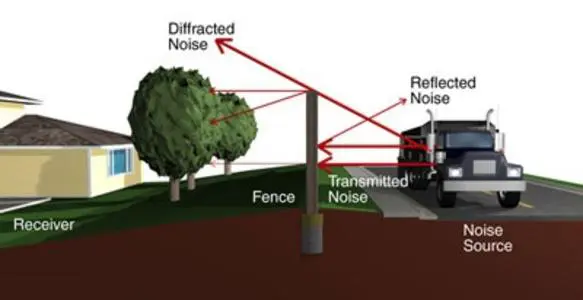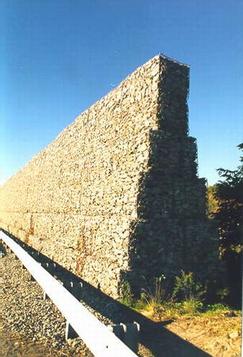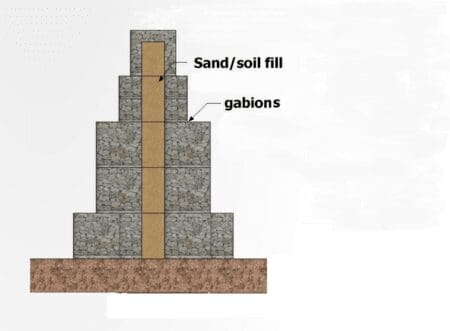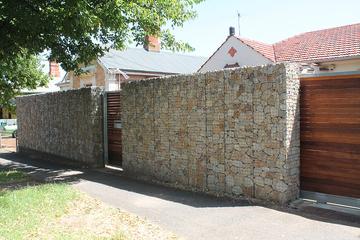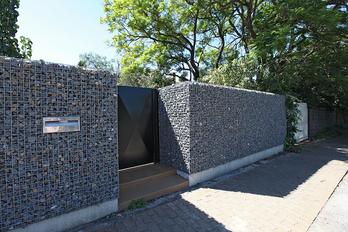Sound Barrier Fence & Walls
Gabion walls are an excellent solution for reducing noise from traffic, loud neighbors and industrial noises. With their sound absorption qualities, gabion walls serve as an effective noise barrier that mitigates sound waves. Since gabions are pouruos, the core of these walls is typically filled with soundproofing materials such as layer sandbags or solid masonry blocks to enhance sound reduction. The examples below are robust gabion walls installed along a busy highway to minimize road noise.
Factors to Consider for an Effective Sound Barrier Fence
There are several factors to consider when making a sound barrier fence. These include:
- The fence placement is vital because the closer it is to the noise, the more effective your soundproofing will be.
- Use white noise and plants to mask the surrounding noise.
- The height of the fence is crucial because if you can see the source of the noise, then you can hear it.
- The construction of the fence is critical because you need to have airtight barriers for optimal sound blocking.
- The fence’s density also matters because the denser it is, the better it will block the noise.
What Materials Will Block Sound?
There are different types of soundproof fences you can select from, and they all offer various levels of effectiveness in soundproofing. While denser or heavier materials tend to block out more sound, they're not the best option for all households.
It will be best to check your HOA and local regulatory guidelines before you begin your fence construction. The job’s complexity will depend on the perimeter, design, material, and property size. Below are the materials that you can use in your fence construction to block sound:
- A chain-link fence will only block sound if you install a sound blanket on it.
- Natural fences are made of trees and make for an attractive solution to blocking surrounding noises. However, they take time to mature.
- Metal fences are cost-efficient, but you will have to add a sound-absorbing material to enhance sound absorption.
- Wooden fences’ effectiveness on soundproofing depends on the installation method and type of wood, but you can add a sound-absorbing material to them.
- Stucco-covered concrete, stone, and brick fences including gabion fences are the best materials to use as sound barriers.
Will a High Fence Reduce Traffic Noise?
Yes, a high fence can help reduce traffic noise, but the fence’s material will also make a difference. Remember: the source of noise can only be blocked if you can’t see it. You should also consider the soundwave path, meaning a higher fence will present a bigger diffraction angle, making for an excellent sound barrier.
Mistakes When Constructing Sound Barrier Fences
Some of the most common mistakes people make when constructing a sound barrier fence include:
- Misunderstanding the sounds. Knowing where the noise comes from will help you determine the best approach.
- Not having a grounded barrier is a costly mistake that will reduce your sound barrier’s effectiveness.
- Leaving gaps in your fence can lead to damages in the long run. Therefore, inspect the perimeter to ensure any issues and vulnerabilities are uncovered and repaired.
- A short fence will not block out the noise effectively. Sound does not travel in a straight line, so the higher the wall, the more effective the barrier.
- Using the wrong materials is a mistake most individuals make. The best materials to use are rammed earth, straw bales, steel sheeting, wood (redwood, cedar), and stone.
Who Might Need a Sound Barrier Fence?
It's not unusual to stay in a quiet neighborhood but still hear the occasional noise, including from your home. Sound barrier fences are great for anyone who does not want the noise that may be coming from the following places:
- HVAC units
- Lawn equipment and power tools
- Constructions
- Parties and cookouts
- Road and traffic noise
- Pool pumps
